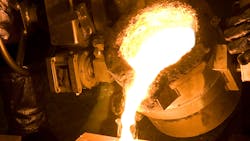Since being diagnosed with silicosis six years, Alan White has changed jobs three times.
He still works on the site of the foundry in Buffalo, N.Y., at which he developed his health problems, the same foundry where his father worked, but now is in the cleanest part of the building.
The jobs, however, and the accompanying pay cuts have taken a toll.
"I’m just surviving, but I’m still here. I’m trying to eat right and take my medicine and just trying to move on,” White said. ‘I can’t recover from this situation.”
He’s tried to find other jobs to no avail.
“Who is going to hire me?” White said.
But at least at his current company, he is part of a union – Union Steelworkers Local 593 – and has health insurance.
“Right now, I have 20 years. If can last a few more years, I have a shot at a pension,” White said.
White first started noticing a problem with his health after filling in for another worker experiencing lung problems.
“It was like a little smoker’s cough,” said White, who had quit smoking more than a decade before.
White felt tired all of the time and kept the cough, leading him at first to suspect that he had walking pneumonia.
Jobs that used to be easy – lifting and moving 50 pounds – became a struggle.
“It felt like the more I breathed in hard, I wasn’t getting more air,” said White.
Doctors eventually identified his condition as silicosis – a chronic lung disease caused by the inhalation of silica particles - a disease White learned would eventually kill him.
“It’s a lifestyle change. There are a lot of things I can’t do anymore,” he said.
Any strenuous physical activity – running, biking, even just trying to keep up with his three grandchildren – is out, as is something low-impact like swimming because of the chemicals in the water. Even grilling is a challenge because of the smoke.
“There are places I can’t work. There are places I can’t go,” White said.
But now, fighting this disease every day, White just wants to spread awareness of the dangers of silica to his coworkers and other at-risk workers.
That’s why in 2013 he testified in support of new silica standards during public hearings held by the U.S. Department of Labor.
“I just want people to know that their life is in their hands,” White said. “You have to find out what you’re working with and what you’re dealing with on your own and just stay safe. You just have to take it upon yourself to be safe.”
About the Author
Ginger Christ
Associate Editor
Ginger Christ is an associate editor for EHS Today, a Penton publication.
She has covered business news for the past seven years, working at daily and weekly newspapers and magazines in Ohio, including the Dayton Business Journal and Crain’s Cleveland Business.
Most recently, she covered transportation and leadership for IndustryWeek, a sister publication to EHS Today.
She holds a bachelor of arts in English and in Film Studies from the University of Pittsburgh.
